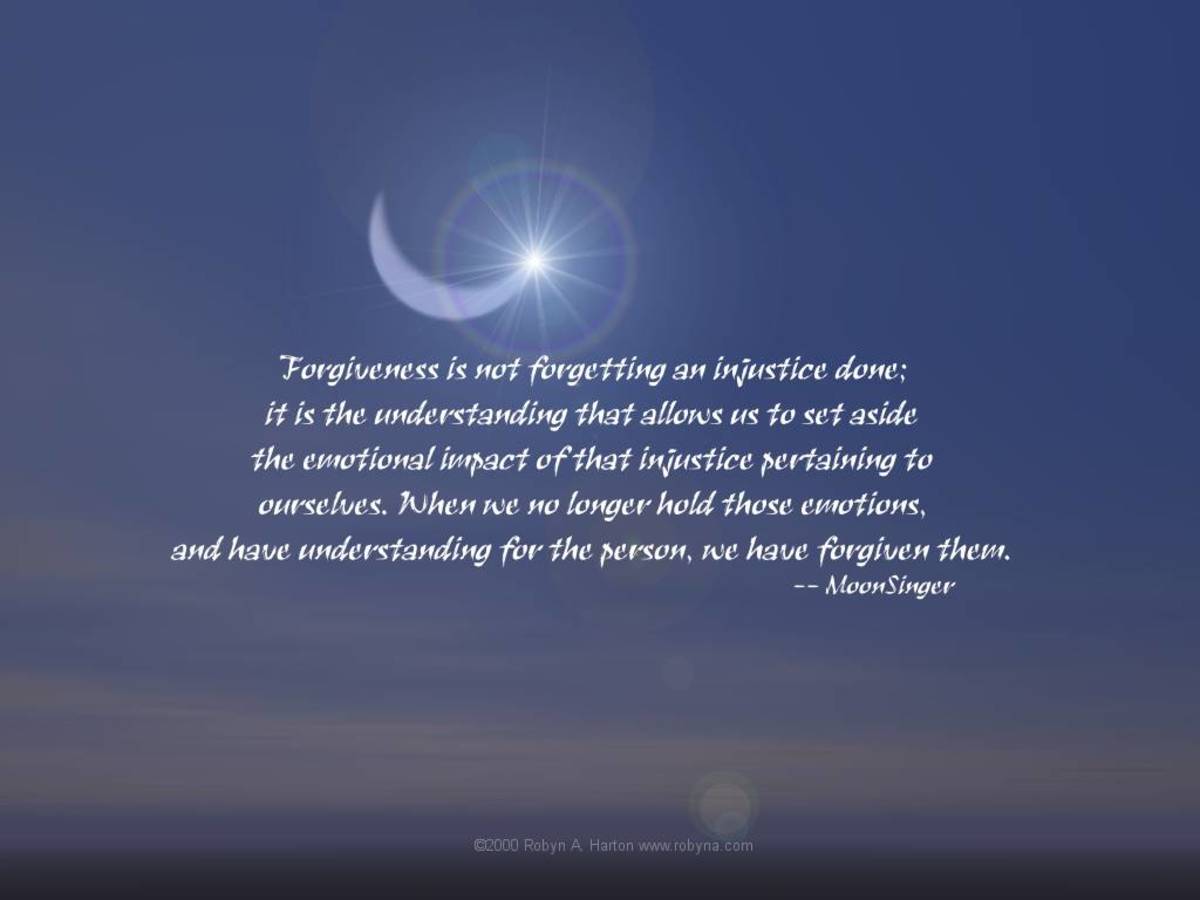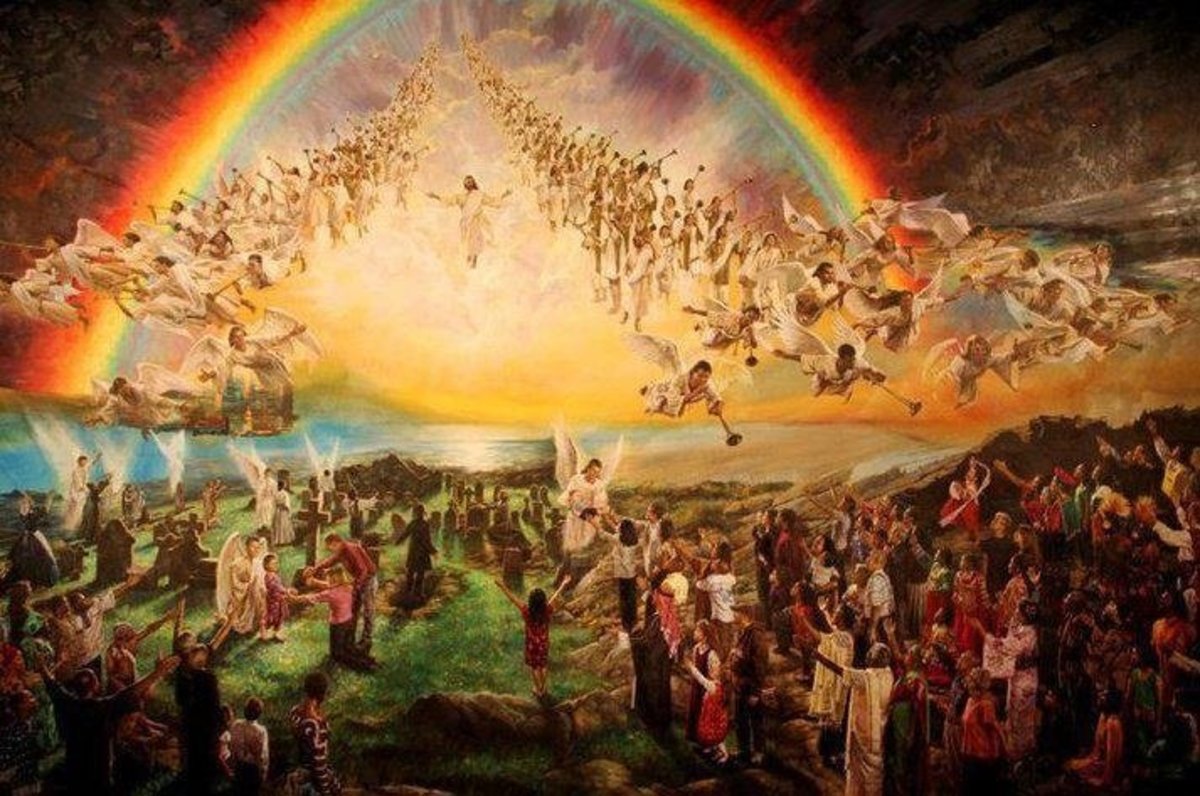Forgiveness and Spiritual Health

What is Forgiveness?
The Dictionary tells us that 'to forgive' means to stop feeling angry, but forgiveness is much more than that. To need forgiveness implies that a wrong has been done; a sin has been committed against another person and against God. To have spiritual health, the sinner needs to ask for forgiveness, but the person who has been sinned against needs to forgive as well.
There are many references in the Bible about forgiving and being forgiven, both in the Old Testament and in the New Testament and we can learn from these.
Forgiveness in the Old Testament
Old Testament records began thousands of years ago when life was raw and living was tough. There were murders and punishment, but it is not until right at the end of Genesis (50.17) that we hear of forgiveness for the first time.
The Early History:
- Joseph's brothers were afraid of him and schemed, sending a messenger praying him to 'forgive the trespass' and evil sin they had committed against him. When Joseph saw them he loved and 'comforted them.'
- The next time someone asks for pardon is when Pharaoh (Ex. 10.17) tells Moses he has sinned against him and against God. He asks Moses to 'entreat' God to remove the locust plague.
- Years later (Ex 32.32), Moses entreats God to forgive the children of Israel's sin when they make and worship a golden image. He even asks God to take his life if He will not forgive the people. In each of these references, there is a mediator between the sinner and God.
The Psalms: King David was a great man of God, but prone to human weakness and when he cries out to God in the Psalms (e.g. Ps. 25.18), those cries are for all of us, for all time. In Ps. 86.5 we are reminded that we must ask before we can be forgiven, and that is the same in our human relationships. We cannot be forgiven if we don't ask.
Forgiveness is Pardon: There are several other instances of forgiveness in the Old Testament and the main purpose in each was to ask for pardon. Sin was seen as a blemish or blot and pardoning was the covering or removing of that blemish. The blood of sacrifices offered to God covered the sin, so it was seen no more.

Forgiveness in the New Testament
As God revealed Himself slowly to humankind over the centuries, we come to the New Testament and His revelation in the Person of Jesus Christ.
There are some interesting parallels with the Old Testament:
- When the Disciples ask Jesus to teach them to pray He echoes the words of Joseph's brothers in Genesis, 'forgive us our trespasses', but now He carries the notion of 'pardon' further: 'as we forgive those who trespass against us' (Matt. 6.12). Before we pray the Lord's Prayer we must first forgive any who have hurt us. Although we may ask for and receive forgiveness from one we have wronged, we have sinned and true forgiveness only comes from God.
- Moses' prayed that God would take his life if the people's sins could be forgiven. God's own Son did just this, dying on the cross as a sacrifice for all time, so that through His blood God is able to forgive our sins. If we are sincerely sorry, God will not only forgive our sins, He will blot them out entirely (Hebrews 9.14-22).
Forgiveness is Pardon, Repentance and Atonement. The Old Testament notion of forgiveness as 'pardon' has now acquired the added conditions of repentance and atonement (Mark 1.4). We must be truly sorry to gain forgiveness and we must make amends with the person and especially with God, so that when we receive His pardon we can return to fellowship with Him.
Spiritual Health and Forgiveness Today
These Biblical revelations From the Old Testament and the New Testament about forgiveness are tenets that still hold today.
God Forgives Us: In the Old Testament we learn how God pardons our sins.
We Forgive Each Other: In the New Testament we learn that unless we completely forgive others, God will not forgive us, but when He does, through Jesus' sacrifice, we have complete freedom from our sins, they are absolutely erased from the record.
We Forgive Ourselves: We do not always forgive ourselves or others.
- Sometimes we keep mulling over the event, asking ourselves how we came to make the mistake, why we did it, instead of accepting God's forgiveness. This is sin and for spiritual health we must learn to forgive ourselves.
- If we have been sinned against and say that we have forgiven, but continue to hold a grudge against the sinner, then we sin and do not have spiritual health. A woman I knew mentioned a time when she received a letter that gave her great hurt. When it was suggested that if she did not forgive she was hurting herself, not the sinner, she replied, "Oh, yes. I've talked to God about it and I've forgiven her. Look, I still have the letter." She thought she had forgiven, but her heart still held a grudge; she had not truly forgiven.
When we ask for and accept God's forgiveness, when we learn to let wrongs go and forgive others and ourselves, then we find true spiritual health and can live in fellowship with others and with God.
The Bible and Christianity
- Bible Storytelling by The Backyard Bards at CMS Summer Under the Son
At the Church Missionary Society's Summer Conference we heard Bible storytelling by a group called The Backyard Bards. It was dramatic, passionate and mind-blowing. We heard Bible passages as we had never heard them before and will never forget. - Communication in a Changing World
Distance communication began in prehistoric times and some of these methods have continued almost until present times. Communication developed slowly over the centuries, but more recently, perhaps beginning with the printing press it has escalated. - How Can We Keep Sundays Holy?
The Fourth Commandment tells us to take a day of rest, but we rarely seem to find time to do this. Rest is as important for our spiritual and physical well-being as rests are in music as they contribute to the harmony. - Billy Graham's Australian Crusades 1959
1959 heralded a change in the life of our family, but that year also brought the Billy Graham Crusade to Australia for the first time. It was the catalyst for change for many Australians as they made a commitment to give their lives to Jesus. - Three or Four Leafed Clover
The word 'luck' has been around for a long time and we often use it. Many people have good luck charms or a four-leaf clover, but St. Patrick used a three-leaf shamrock to teach the Irish about the Trinity. Christians should rely on God, not luck. - How to Say Grace
We should know the difference between prayers before meals and saying grace. Grace before meals is a very old tradition and the article looks at the genre and some of its history, concluding that Christians should always thank God for our food. - A Meditation on Psalm 32 - Taizé Style
A meditation for Lent that combines Psalm 32, prose and poetry. When we pray to be forgiven God cleanses us from sin and surrounds us with His love now and for all eternity.









